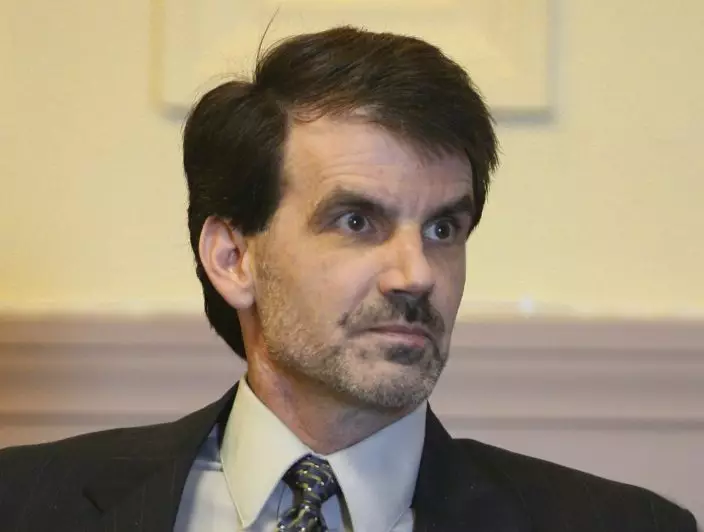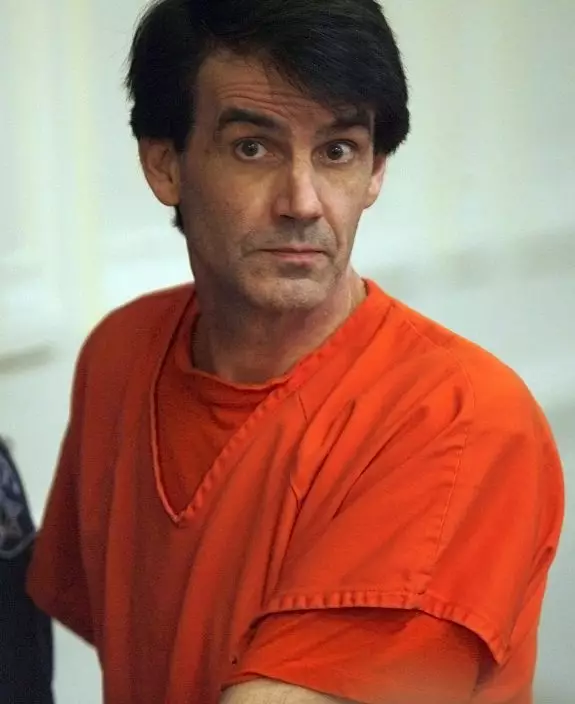The day after Thanksgiving in 2009, James Kahler went to the home of his estranged wife's grandmother, where he shot the two women, along with his two teenage daughters.
No one — not even Kahler's attorneys — disputes that he killed the four relatives. Instead, his lawyers argue that he was suffering from depression so severe that he experienced extreme emotional disturbance, dissociating him from reality.
What had been an open-and-shut death penalty case — Kahler was convicted and sentenced in 2011 — was upended when the U.S. Supreme Court said this past week that it would consider whether Kansas unconstitutionally abolished his right to use insanity as a defense. A ruling from the nation's highest court could have far-reaching implications for mentally ill defendants across the nation.

In this June 2010, file photo, James Kraig Kahler sits in the jury box at the Osage County District Courtroom before court in Lyndon, Kansas. The U.S. Supreme Court has agreed to consider a Kansas death penalty case that could have implications for mentally ill defendants across the nation. The case involves Kahler, convicted and sentenced to death for the 2009 fatal shootings of his estranged wife, her grandmother and his two teenage daughters. His attorneys argue that he was suffering from depression so severe that he experienced extreme emotional disturbance, dissociating him from reality. (Thad AltonThe Topeka Capital-Journal via AP)
Kansas is one of five states where a traditional insanity defense in which a person must understand the difference between right and wrong before being found guilty of a crime isn't allowed. Instead, someone can cite "mental disease or defect" as a partial defense but must prove that he didn't intend to commit the crime. The other states with similar laws are Alaska, Idaho, Montana and Utah.
"A favorable decision in this case would make it clear that the Constitution requires that a defendant be able to understand the difference between right and wrong before being found guilty, and, in cases like Mr. Kahler's, put to death," his defense attorney, Meryle Carver-Allmond, said in an email.
Kahler's lawyers argued in their petition to the Supreme Court that although Kahler knew that he was shooting human beings, his mental state was so disturbed at the time that he was unable to control his actions.

FILE--In this Oct. 2011, file photo, James Kraig Kahler listens to the judge while being sentenced in Osage County Court in Lyndon, Kansas. The U.S. Supreme Court has agreed to consider a Kansas death penalty case that could have implications for mentally ill defendants across the nation. The case involves Kahler, convicted and sentenced to death for the 2009 fatal shootings of his estranged wife, her grandmother and his two teenage daughters. His attorneys argue that he was suffering from depression so severe that he experienced extreme emotional disturbance, dissociating him from reality. (AP PhotoAnthony S. Bush, Pool, File)
"We're hopeful that, in taking Mr. Kahler's case, the United States Supreme Court has indicated a desire to find that the Constitution requires better of us in our treatment of mentally ill defendants," Carver-Allmond said.
The state argues that it hasn't abolished the insanity defense, just modified it.
"We think the state's approach, providing for an insanity defense based on mental disease or defect, satisfies constitutional requirements," Kansas Attorney General Derek Schmidt said in an emailed statement. "We look forward to defending the statute and arguing our case before the Justices in the fall."
Kahler was in the middle of a contentious divorce when he went to Dorothy Wight's home in Burlingame, where his wife, Karen, and three children were spending the Thanksgiving holiday amid contentious divorce proceedings. He found Karen in the kitchen and shot her twice, then shot Wright and his daughter Emily in the living room. He found his daughter Lauren in an upstairs bedroom. His son, Sean, fled to a neighboring house.
Sherrie Baughn, executive director of the Kansas chapter of the National Alliance for Mental Illness, said her organization opposes execution of individuals who have a serious mental illness or mental disability when committing a crime.
"I am happy that they are looking at it and reviewing this," Baughn said of the Supreme Court decision to take up the Kansas case. "Despite constitutional protections, the death penalty is still somewhat applied to people with mental illness or mental disabilities."
It is unclear how often an insanity defense would be used in Kansas, because the state hasn't really had one for so many years now, Carver-Allmond said. Without the option, seriously mentally ill defendants are often left to go to trial with little-to-no defense or forced to plead guilty on bad terms.
Here’s a rundown of the AP’s latest Election 2024 coverage plans, including live video and text plans, our explanatory journalism and highlights from previous cycles. Candidate schedules are included when available. All times are EDT.
You can find US Election 2024-The Daily Rundown in your CMS or in AP Newsroom.
For up-to-the-minute information on AP’s coverage, visit AP Newsroom’s Coverage Plan. Find our election coverage in the U.S. Elections hub in AP Newsroom.
To sign up for our Politics Advisory, delivered afternoons Monday through Friday to your inbox, click here.
TRUMP TRIAL OPENING-AP EXPLAINS — Opening statements in Donald Trump’s hush money trial set the stage for weeks of testimony about the former president’s personal life and places his legal troubles at the center of his closely contested campaign against President Joe Biden. An AP reporter debrief. Newsroom Ready and Consumer Ready edits.
BIDEN-EARTH DAY — President Joe Biden marked Earth Day by announcing $7 billion in federal grants for residential solar projects serving households in low- and middle-income communities — while blasting Republicans who want to gut his policies to address climate change. Newsroom Ready and Consumer Ready edits.
President Joe Biden campaigns in Tampa, Florida. Events at 3 p.m. and 4:15 p.m.
++ Candidate schedules are subject to change. Coverage of some events is on merits. ++
7 a.m. — Live NY Trump Pool coverage outside of Trump Tower in New York is planned.
8:30 a.m. — Live NY Trump Pool or Live AP coverage outside of the courthouse in New York is planned.
9 a.m. — Live pool coverage from the courthouse hallway in New York is planned.
4:15 p.m. — Live US Network Pool of President Joe Biden’s campaign event in Tampa, Florida.
TRUMP-HUSH-MONEY-MEDIA-BLOGS — With cameras not allowed at former President Donald Trump’s hush money trial in New York, live news blogs are coming into their own as an important news tool. SENT: 710 words, photos.
TRUMP-HUSH MONEY — A longtime tabloid publisher is expected to tell jurors about his efforts to help Donald Trump stifle unflattering stories during the 2016 campaign as testimony resumes in the historic hush money trial of the former president. David Pecker, the former National Enquirer publisher, will be back on the stand Tuesday. SENT: 1,160 words, photos, video. UPCOMING: 1,200 words after trial resumes at 9:30 a.m.
ELECTION 2024-TRUMP-ELECTION INTERFERENCE — Donald Trump faces serious charges in two separate cases over whether he attempted to subvert the Constitution by overturning the results of a fair election. Yet it’s a New York case centered on payments to silence an adult film star that might provide the only legal reckoning this year. Some legal experts are dubious about attempting to tie a record-keeping case to manipulating an election. SENT: 1,050 words, photos.
SUPREME COURT-TRUMP-CAPITOL RIOT-THINGS TO KNOW — The core issue being debated before the Supreme Court on Thursday boils down to this: Whether a former president is immune from prosecution for actions taken while in office — and, if so, what is the extent of the immunity? SENT: 1,070 words, photo.
ELECTION 2024-PENNSYLVANIA — Pennsylvania primaries on Tuesday will cement the lineup for a high-stakes U.S. Senate race between Democratic Sen. Bob Casey and Republican challenger David McCormick. Joe Biden and Donald Trump are expected to win their presidential nominations easily. SENT: 890 words, photos. Polls close at 8 p.m.
ELECTION 2024-BIDEN-ABORTION — President Joe Biden is heading to Tampa, Florida, to decry the state’s looming six-week abortion ban as his campaign continued to seize on reproductive rights as a key campaign issue. SENT: 890 words, photos, video.
TRUMP-HUSH MONEY — Donald Trump tried to illegally influence the 2016 presidential election by preventing damaging stories about his personal life from becoming public, a prosecutor told jurors at the start of the former president’s historic hush money trial. SENT: 1,270 words, photos, video. With TRUMP-HUSH MONEY-TAKEAWAYS — Opening statements provide a clear roadmap of how prosecutors will try to make the case that Trump broke the law, and how the defense plans to fight the charges.
BIDEN-EARTH DAY — President Joe Biden marked Earth Day by announcing $7 billion in federal grants for residential solar projects serving 900,000-plus households in low- and middle-income communities — while criticizing Republicans who want to gut his policies to address climate change. SENT: 860 words, photos.
Tue., April 23 — Pennsylvania presidential primary.
Sun., April 28 — Puerto Rico Democratic presidential primary.
May 7 — Indiana presidential primary.
May 14 — Maryland presidential primary, Nebraska presidential primary and West Virginia presidential primary.
May 21 — California 20th Congressional District special election, Kentucky presidential primary, Oregon presidential primary.
For coverage and planning questions, the Nerve Center can be reached at +1 800 845 8450 (ext. 1600). For access to AP Newsroom and other technical issues, contact apcustomersupport@ap.org or call +1 844 777 2006.

Former president Donald Trump, center, awaits the start of proceedings at Manhattan criminal court, Monday, April 22, 2024, in New York. Opening statements in Donald Trump's historic hush money trial are set to begin. Trump is accused of falsifying internal business records as part of an alleged scheme to bury stories he thought might hurt his presidential campaign in 2016. (AP Photo/Yuki Iwamura, Pool)












